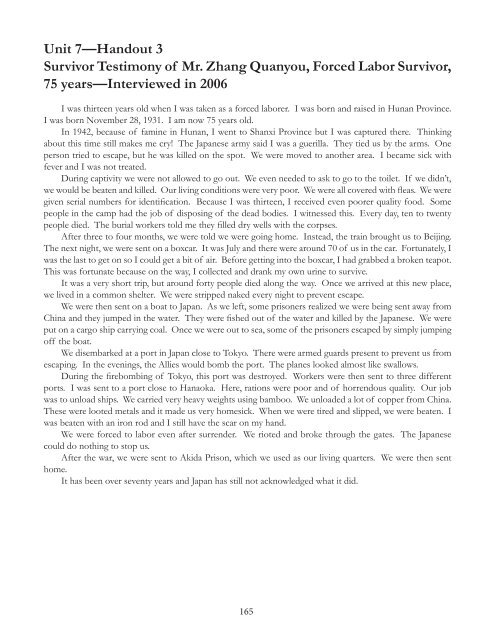Download - Canada ALPHA
Download - Canada ALPHA
Download - Canada ALPHA
You also want an ePaper? Increase the reach of your titles
YUMPU automatically turns print PDFs into web optimized ePapers that Google loves.
Unit 7—Handout 3<br />
Survivor Testimony of Mr. Zhang Quanyou, Forced Labor Survivor,<br />
75 years—Interviewed in 2006<br />
I was thirteen years old when I was taken as a forced laborer. I was born and raised in Hunan Province.<br />
I was born November 28, 1931. I am now 75 years old.<br />
In 1942, because of famine in Hunan, I went to Shanxi Province but I was captured there. Thinking<br />
about this time still makes me cry! The Japanese army said I was a guerilla. They tied us by the arms. One<br />
person tried to escape, but he was killed on the spot. We were moved to another area. I became sick with<br />
fever and I was not treated.<br />
During captivity we were not allowed to go out. We even needed to ask to go to the toilet. If we didn’t,<br />
we would be beaten and killed. Our living conditions were very poor. We were all covered with fl eas. We were<br />
given serial numbers for identifi cation. Because I was thirteen, I received even poorer quality food. Some<br />
people in the camp had the job of disposing of the dead bodies. I witnessed this. Every day, ten to twenty<br />
people died. The burial workers told me they fi lled dry wells with the corpses.<br />
After three to four months, we were told we were going home. Instead, the train brought us to Beijing.<br />
The next night, we were sent on a boxcar. It was July and there were around 70 of us in the car. Fortunately, I<br />
was the last to get on so I could get a bit of air. Before getting into the boxcar, I had grabbed a broken teapot.<br />
This was fortunate because on the way, I collected and drank my own urine to survive.<br />
It was a very short trip, but around forty people died along the way. Once we arrived at this new place,<br />
we lived in a common shelter. We were stripped naked every night to prevent escape.<br />
We were then sent on a boat to Japan. As we left, some prisoners realized we were being sent away from<br />
China and they jumped in the water. They were fi shed out of the water and killed by the Japanese. We were<br />
put on a cargo ship carrying coal. Once we were out to sea, some of the prisoners escaped by simply jumping<br />
off the boat.<br />
We disembarked at a port in Japan close to Tokyo. There were armed guards present to prevent us from<br />
escaping. In the evenings, the Allies would bomb the port. The planes looked almost like swallows.<br />
During the fi rebombing of Tokyo, this port was destroyed. Workers were then sent to three different<br />
ports. I was sent to a port close to Hanaoka. Here, rations were poor and of horrendous quality. Our job<br />
was to unload ships. We carried very heavy weights using bamboo. We unloaded a lot of copper from China.<br />
These were looted metals and it made us very homesick. When we were tired and slipped, we were beaten. I<br />
was beaten with an iron rod and I still have the scar on my hand.<br />
We were forced to labor even after surrender. We rioted and broke through the gates. The Japanese<br />
could do nothing to stop us.<br />
After the war, we were sent to Akida Prison, which we used as our living quarters. We were then sent<br />
home.<br />
It has been over seventy years and Japan has still not acknowledged what it did.<br />
165


